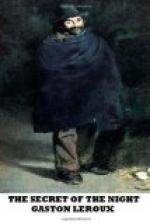Koupriane did not restrain his rage. He showered the unhappy man with blows, having thrown Rouletabille to the end of the room when he tried to interfere. And while he proceeded with the punishment the Chief of Police hurled at the agent who had betrayed him an accompaniment of fearful threats, promising him that before he was hanged he should rot in the bottom-most dungeon of Peter and Paul, in the slimy pits lying under the Neva. Touman, between the two guards who held him, and who sometimes received blows on the rebound that were not intended for them, never uttered a complaint. Outside the invectives of Koupriane there was heard only the swish of the cords and the cries of Rouletabille, who continued to protest that it was abominable, and called the Chief of Police a savage. Finally the savage stopped. Gouts of blood had spattered all about.
“Monsieur,” said Rouletabille, who supported himself against the wall. “I shall complain to the Tsar.”
“You are right,” Koupriane replied, “but I feel relieved now. You can’t imagine the harm this man can have done to us in the weeks he has been here.”
Touman, across whose shoulders they had thrown his coat and who lay now across a chair, found strength to look up and say:
“It is true. You can’t do me as much harm as I have done you, whether you think so or not. All the harm that can be done me by you and yours is already accomplished. My name is not Touman, but Matiev. Listen. I had a son that was the light of my eyes. Neither my son nor I had ever been concerned with politics. I was employed in Moscow. My son was a student. During the Red Week we went out, my son and I, to see a little of what was happening over in the Presnia quarter. They said everybody had been killed over there! We passed before the Presnia gate. Soldiers called to us to stop because they wished to search us. We opened our coats. The soldiers saw my son’s student waistcoat and set up a cry. They unbuttoned the vest, drew a note-book out of his pocket and they found a workman’s song in it that had been published in the Signal. The soldiers didn’t know how to read. They believed the paper was a proclamation, and they arrested my son. I demanded to be arrested with him. They pushed me away. I ran to the governor’s house. Trebassof had me thrust away from his door with blows from the butt-ends of his Cossacks’ guns. And, as I persisted, they kept me locked up all that night and the morning of the next day. At noon I was set free. I demanded my son and they replied they didn’t know what I was talking about. But a soldier that I recognized as having arrested my son the evening before pointed out a van that was passing, covered with a tarpaulin and surrounded by Cossacks. ’Your son is there,’ he said; ‘they are taking him to the graves.’ Mad with despair, I ran after the van. It went to the outskirts of Golountrine cemetery. There




